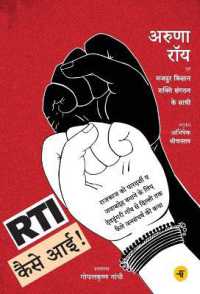- ホーム
- > 洋書
- > 英文書
- > Literary Criticism
Full Description
Proverbs constitute a rich archive of historical, cultural, and linguistic significance that affect genres and linguistics codes. They circulate through writers, texts, and communities in a process that ultimately results in modifications in their structure and meanings. Hence, context plays a crucial role in defining proverbs as well as in determining their interpretation. Vincenzo Brusantino's Le cento novella (1554), John Florio's Firste Fruites (1578) and Second Frutes (1591), and Pompeo Sarnelli's Posilecheata (1684) offer clear representations of how traditional wisdom and communal knowledge reflect the authors' personal perspectives on society, culture, and literature. The analysis of the three authors' proverbs through comparisons with classical, medieval, and early modern collections of maxims and sententiae provides insights on the fluidity of such expressions, and illustrates the tight relationship between proverbs and sociocultural factors. Brusantino's proverbs introduce ethical interpretations to the one hundred novellas of Boccaccio's The Decameron, which he rewrites in octaves of hendecasyllables. His text appeals to Counter-Reformation society and its demand for a comprehensible and immediately applicable morality. In Florio's two bilingual manuals, proverbs fulfill a need for language education in Elizabethan England through authentic and communicative instruction. Florio manipulates the proverbs' vocabulary and syntax to fit the context of his dialogues, best demonstrating the value of learning Italian in a foreign country. Sarnelli's proverbs exemplify the inherent creative and expressive potentialities of the Neapolitan dialect vis-?á-vis languages with a more robust literary tradition. As moral maxims, ironic assessments, or witty insertions, these proverbs characterize the Neapolitan community in which the fables take place.
Contents
Acknowledgments
Foreword
Criteria for Transcription
Notes on Quotations, Translations, and Abbreviations
Chapter One: Literary History and Theories of Paremias
Chapter Two: Vincenzo Brusantino's Le cento novella: Paremias and Tridentine Ethics in Reinterpreting the Decameron
Chapter Three: John Florio's Firste Fruites and Second Frutes: Paremias and Elizabethan Teaching of the Italian Language
Chapter Four: Pompeo Sarnelli's Posilecheata: Paremias and the Multifaceted Neapolitan Baroque
Conclusion
Index of Paremias in Le cento novella, Firste Fruites, Second Frutes, and Posilecheata
Notes
Works Consulted
Index of Names








